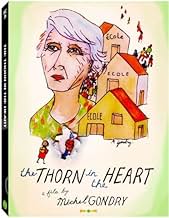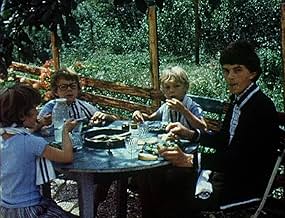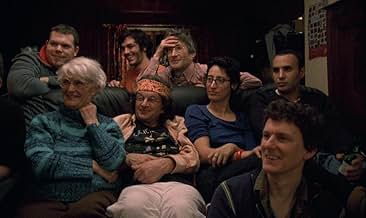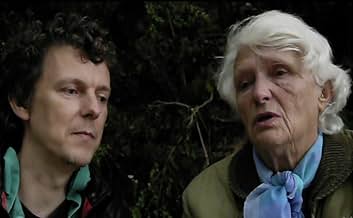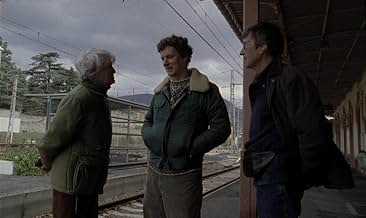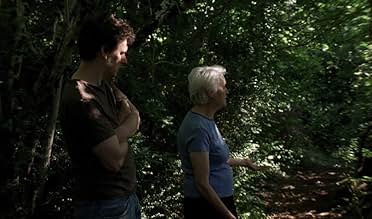Aggiungi una trama nella tua linguaMichel Gondry chronicles the life of Gondry family matriarch, his aunt Suzette Gondry, and her relationship with her son, Jean-Yves.Michel Gondry chronicles the life of Gondry family matriarch, his aunt Suzette Gondry, and her relationship with her son, Jean-Yves.Michel Gondry chronicles the life of Gondry family matriarch, his aunt Suzette Gondry, and her relationship with her son, Jean-Yves.
- Premi
- 2 candidature totali
Recensioni in evidenza
I was able to see this movie at SXSW this year, and I'm grateful that I had that privilege.
I really enjoy being able to look into a stranger's life and just learn random tidbits that would otherwise remain unknown. Being able to see the life of Suzette Gondry was very interesting. The film seemed like a personal movie that Michel made just for him and his family, but it was neat being able to watch this film and feel as if you're being welcomed into their lives--if even just a small part.
After learning about all the ups and downs of her life and watching the impact she has had on many people, I felt as if Suzette had been a part of my life.
I really enjoy being able to look into a stranger's life and just learn random tidbits that would otherwise remain unknown. Being able to see the life of Suzette Gondry was very interesting. The film seemed like a personal movie that Michel made just for him and his family, but it was neat being able to watch this film and feel as if you're being welcomed into their lives--if even just a small part.
After learning about all the ups and downs of her life and watching the impact she has had on many people, I felt as if Suzette had been a part of my life.
What? No Gondrys on IMDb today? Well then I guess the rest of us can pack up and go home. Forgive me for being insensitive to cinematic master Michel Gondry's cherished family memories, but I'm going to have some fun slamming this film. Why? Because if nothing else, I don't want my review to bore you as much as "The Thorn in the Heart" bored me.
Seriously I could only take about 40 minutes, and even that was because my dog was lying on the remote so I couldn't shut it off.
All kidding aside, before I start I'd like to quote something said by the late, great Stanley Kubrick when asked if he used LSD to get his uniquely bizarre ideas. He answered, "No. I believe that drugs are basically of more use to the audience than to the artist ... One of the things that's turned me against LSD is that all the people I know who use it have a peculiar inability to distinguish between things that are really interesting and stimulating and things that appear so in the state of universal bliss the drug induces on a good trip." (Agel, The Making of Kubrick's 2001, 1970, excerpted from the Playboy interview, p. 346)
"The Thorn in the Heart" is about Suzette Gondry, Michel's aunt. Now I would say that Michel obviously finds that subject to be really interesting. However, I submit that his subjective and emotional involvement with his aunt severely compromised his "ability to distinguish between things that are really interesting and things that appear so in a state of universal bliss." Whether LSD was involved is a different matter.
The film opens with a scene around the dinner table of about 12. No one is introduced, we're just supposed to piece together who's who (incidentally, the whole documentary is shot this way... fine for family albums but not so easy for us outsiders to follow). The woman referred to as Suzette chimes in with a story. It goes on for a painfully long time because she keeps breaking into laughter in mid sentence, getting more and more hysterical with her unfinished story until the others at the table literally begin a different conversation, something about vomits and farts (I'm not kidding). Suzette eventually finishes the anecdote, but by this time everything has dragged on so long that nobody, least of all the audience, gets the point. Literally, a few people ask her to repeat the punchline. "He could've had what? ...Oh, sauerkraut? Oh haha," they laugh languidly. Sure, to the Gondry family it's an endearing moment. But to us, meeting someone for the first time and sitting through this, it's slightly aggravating. And believe it or not, that opening scene was the most eventful scene in the 40 minutes I sat watching, while carefully trying to roll my dog off the remote so not to disturb her sleep, which seemed far more enjoyable than my experience on the couch.
I feel like the documentary could have benefited tremendously from an objective co-director, someone who could politely tell Michel that people don't understand inside jokes of strangers. And instead of putting the film together in a dry, historical way (chronologically beginning at 1954 and progressing year by year by year), the objective editor might have suggested to begin with something sensational and dramatic, the way even famous biopics are structured so that the audience is given a reason to invest their time watching.
Is this a bad film? Certainly not. I do distinguish between 'bad' and 'boring' (often they are not synonymous). But for me, this film conjured up nightmarish memories of the times I would end up at a stranger's party, not knowing a soul, not understanding all their inside jokes, and growing more awkward and agoraphobic by the minute. I no longer go to strangers' parties, wisely. And I think I'll make it a rule that I'll no longer watch strangers' home movies. "Voyeuristic" is a word used by another reviewer, and I now understand what was meant by it. To the Gondry family, I'm genuinely happy that you have this excellent way of preserving your cherished family memories. With all due respect, I'll just put this DVD back where I found it, as if I had accidentally bumped a priceless heirloom I had no business bumping.
So if you decide to watch, be ready to accept that the Gondry family is important enough to spend 84 minutes learning about. Devoid of Michel's usual creative visuals and surrealistic storytelling, this film is a very flat documentary. If the subject doesn't immediately entice you, then you're outta luck. Unless of course you manage to drop a tab beforehand.
Seriously I could only take about 40 minutes, and even that was because my dog was lying on the remote so I couldn't shut it off.
All kidding aside, before I start I'd like to quote something said by the late, great Stanley Kubrick when asked if he used LSD to get his uniquely bizarre ideas. He answered, "No. I believe that drugs are basically of more use to the audience than to the artist ... One of the things that's turned me against LSD is that all the people I know who use it have a peculiar inability to distinguish between things that are really interesting and stimulating and things that appear so in the state of universal bliss the drug induces on a good trip." (Agel, The Making of Kubrick's 2001, 1970, excerpted from the Playboy interview, p. 346)
"The Thorn in the Heart" is about Suzette Gondry, Michel's aunt. Now I would say that Michel obviously finds that subject to be really interesting. However, I submit that his subjective and emotional involvement with his aunt severely compromised his "ability to distinguish between things that are really interesting and things that appear so in a state of universal bliss." Whether LSD was involved is a different matter.
The film opens with a scene around the dinner table of about 12. No one is introduced, we're just supposed to piece together who's who (incidentally, the whole documentary is shot this way... fine for family albums but not so easy for us outsiders to follow). The woman referred to as Suzette chimes in with a story. It goes on for a painfully long time because she keeps breaking into laughter in mid sentence, getting more and more hysterical with her unfinished story until the others at the table literally begin a different conversation, something about vomits and farts (I'm not kidding). Suzette eventually finishes the anecdote, but by this time everything has dragged on so long that nobody, least of all the audience, gets the point. Literally, a few people ask her to repeat the punchline. "He could've had what? ...Oh, sauerkraut? Oh haha," they laugh languidly. Sure, to the Gondry family it's an endearing moment. But to us, meeting someone for the first time and sitting through this, it's slightly aggravating. And believe it or not, that opening scene was the most eventful scene in the 40 minutes I sat watching, while carefully trying to roll my dog off the remote so not to disturb her sleep, which seemed far more enjoyable than my experience on the couch.
I feel like the documentary could have benefited tremendously from an objective co-director, someone who could politely tell Michel that people don't understand inside jokes of strangers. And instead of putting the film together in a dry, historical way (chronologically beginning at 1954 and progressing year by year by year), the objective editor might have suggested to begin with something sensational and dramatic, the way even famous biopics are structured so that the audience is given a reason to invest their time watching.
Is this a bad film? Certainly not. I do distinguish between 'bad' and 'boring' (often they are not synonymous). But for me, this film conjured up nightmarish memories of the times I would end up at a stranger's party, not knowing a soul, not understanding all their inside jokes, and growing more awkward and agoraphobic by the minute. I no longer go to strangers' parties, wisely. And I think I'll make it a rule that I'll no longer watch strangers' home movies. "Voyeuristic" is a word used by another reviewer, and I now understand what was meant by it. To the Gondry family, I'm genuinely happy that you have this excellent way of preserving your cherished family memories. With all due respect, I'll just put this DVD back where I found it, as if I had accidentally bumped a priceless heirloom I had no business bumping.
So if you decide to watch, be ready to accept that the Gondry family is important enough to spend 84 minutes learning about. Devoid of Michel's usual creative visuals and surrealistic storytelling, this film is a very flat documentary. If the subject doesn't immediately entice you, then you're outta luck. Unless of course you manage to drop a tab beforehand.
Gondry's movies are usually strong because they're visually original, creative and have a unique DIY innovative edge, while reflecting genuine humanistic tendencies.
The life of the director's aunt is used here in that vein - except there's willingly little to enjoy visually: Gondry attempts to shoot a documentary and aims at a certain 'realism'. Except here, maybe because he's familiar with the cast, which would allow him to ask intimate questions to relatives in the private sphere, 'realism' becomes 'voyeurism'. Questions asked to the poor cast are just plain bad taste. And the humanistic tendencies Gondry so beautifully explored in all his previous movies are travestied in facebook-era voyeurism.
A poor, disappointing 'effort' which can evoke, quite oddly, the most sadistic of Andre Gide. Except Gide is fully aware of what he's doing - which Gondry doesn't even notice.
The life of the director's aunt is used here in that vein - except there's willingly little to enjoy visually: Gondry attempts to shoot a documentary and aims at a certain 'realism'. Except here, maybe because he's familiar with the cast, which would allow him to ask intimate questions to relatives in the private sphere, 'realism' becomes 'voyeurism'. Questions asked to the poor cast are just plain bad taste. And the humanistic tendencies Gondry so beautifully explored in all his previous movies are travestied in facebook-era voyeurism.
A poor, disappointing 'effort' which can evoke, quite oddly, the most sadistic of Andre Gide. Except Gide is fully aware of what he's doing - which Gondry doesn't even notice.
Just saw this film in NYC, there was also a Q&A after with the man himself after.
I found the film to be a beautiful portrait of someone's life, and how the people around them are affected. Michel said in the Q&A that he wanted to give his Aunt some visual record/history of her life, and this film goes to show that you don't need to create a Hollywood fictional character, real people are just as interesting and entertaining. Gondry uses a mixture of visual formats to illustrate the documentary, from super 8 to his well known stop motion. This adds a richness, and a historical depth that works within the context of the film. The film is emotionally moving at times and also humorous. The film is simple and enjoyable, one that does not need to be taken too seriously, yet carries tones of a maturity in Gondry's work that is often not always so prominent.
Go see it!
I found the film to be a beautiful portrait of someone's life, and how the people around them are affected. Michel said in the Q&A that he wanted to give his Aunt some visual record/history of her life, and this film goes to show that you don't need to create a Hollywood fictional character, real people are just as interesting and entertaining. Gondry uses a mixture of visual formats to illustrate the documentary, from super 8 to his well known stop motion. This adds a richness, and a historical depth that works within the context of the film. The film is emotionally moving at times and also humorous. The film is simple and enjoyable, one that does not need to be taken too seriously, yet carries tones of a maturity in Gondry's work that is often not always so prominent.
Go see it!
The documentary about Suzette's professional life is good and interesting, mainly when Suzette's former students appear to talk about their memories and the impact of Suzette's work for their lives.
However, I considered extremely unnecessary the details about her personal life, mainly about her life with her son, Jean-Yves.
The film would be a documentary, not a drama and, although I like his works as director, I think he used those personal dramas to bring more appeal to the film, what I considered regrettable.
The music is good and, although simple, Gondry shows why he could create good films, however not this, specifically.
However, I considered extremely unnecessary the details about her personal life, mainly about her life with her son, Jean-Yves.
The film would be a documentary, not a drama and, although I like his works as director, I think he used those personal dramas to bring more appeal to the film, what I considered regrettable.
The music is good and, although simple, Gondry shows why he could create good films, however not this, specifically.
Lo sapevi?
- ConnessioniEdited from Tempesta (1941)
I più visti
Accedi per valutare e creare un elenco di titoli salvati per ottenere consigli personalizzati
Dettagli
- Data di uscita
- Paese di origine
- Lingua
- Celebre anche come
- The Thorn in the Heart
- Aziende produttrici
- Vedi altri crediti dell’azienda su IMDbPro
Botteghino
- Lordo Stati Uniti e Canada
- 7376 USD
- Fine settimana di apertura Stati Uniti e Canada
- 5173 USD
- 4 apr 2010
- Lordo in tutto il mondo
- 17.849 USD
- Tempo di esecuzione1 ora 26 minuti
- Colore
Contribuisci a questa pagina
Suggerisci una modifica o aggiungi i contenuti mancanti

Divario superiore
By what name was L'épine dans le coeur (2009) officially released in Canada in English?
Rispondi

